 |
|

In May, I gave my first speech on the Senate floor, where I outlined the four policy priorities that will guide my season of service in the United States Senate. I’m taking this month to share each of these priorities in more detail and how I’m working to move them forward.
So, let’s be honest—it’s time we talk more openly about the importance of innovative, American energy. Consumers are asking for energy choices that are more affordable, reliable, and clean. At the same time, we need to be realistic about the demands of powering a modern nation. Solving a problem is great. Solving the right problem is better. That lesson has stuck with me. If we want to remain competitive and protect our independence, we must modernize permitting and let America build the infrastructure necessary to keep up.
I am convinced that a healthy economy and a healthier environment are not mutually exclusive—they are inseparable. The simple truth is that Americans deserve energy policy that lowers costs, strengthens our economy, and adds new opportunities for families and businesses.
That begins with acknowledging the reality of energy addition. The demand for electricity is growing faster than ever, fueled by new technologies like artificial intelligence, advanced manufacturing, and crypto. To meet this surge, we must add dependable new capacity to the grid and make sure it comes from American workers and American ingenuity.
Finally, we must ensure reliability. Business leaders making long-term investments need predictability. If energy incentives are pulled back too quickly, projects will stall, jobs will be lost, and families will feel the impact through higher costs. But with a careful, predictable phase-out, we can maintain certainty, protect thousands of jobs, and deliver on President Trump’s promise to keep energy prices low.
Utahns understand thrift, discipline, and foresight. By applying those values to energy policy, we can keep America strong, secure, and prosperous. An America that continues to lead the world in both strength and opportunity and thrives on affordable, reliable, and clean energy.


|
|

Senator Curtis emphasized Utah’s leadership in making nuclear a practical and viable clean energy solution during an Environment and Public Works Committee hearing with David Wright, nominee to be a Member of the Nuclear Regulatory Commission (NRC). During the exchange, Senator Curtis cited past challenges and the need for collaboration with the NRC, and stressed the importance of regulatory certainty and clarity for innovators and utilities.
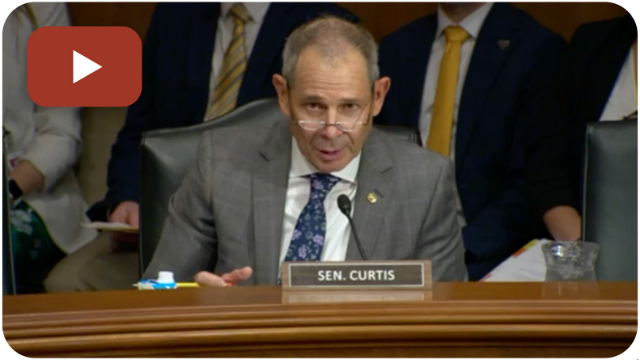

Senator Curtis shared the following statement after voting in favor of the Big Beautiful Bill, landmark legislation that secures the border, delivers permanent tax relief for Utah families, and gives business certainty on energy policy:
“The Big Beautiful Bill delivers for Utahns. It secures the border, provides permanent tax relief for working families, and strengthens our military. I’m grateful to Leader Thune and Finance Chair Crapo for including my changes to the energy credits—key for business certainty and for Utah’s energy future. I look forward to the House sending it to the President before the Fourth.”
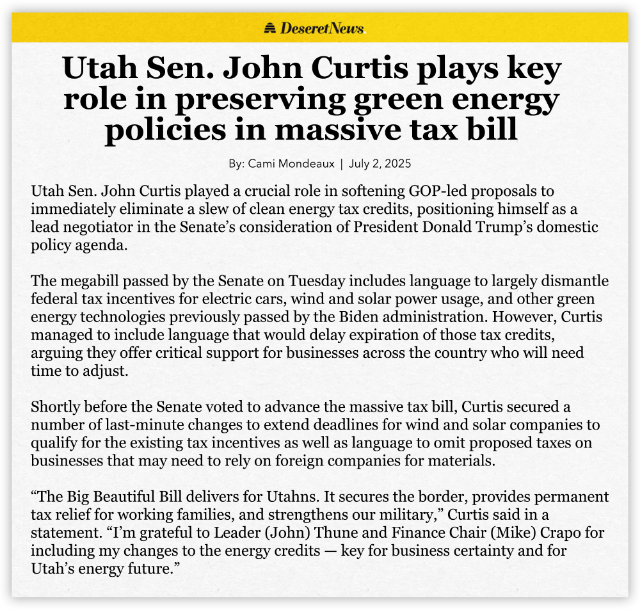
Full story by Cami Mondeaux here.

Republicans are committed to leaving the Earth better than we found it, and we shouldn’t shy away from the climate conversation. During the POLITICO Energy Summit, Senator Curtis highlighted how the United States has reduced more greenhouse gas emissions than any other country—thanks in large part to conservative solutions. When Republicans have a seat at the table, our insights become actionable policies that strengthen American energy policy and environmental stewardship.
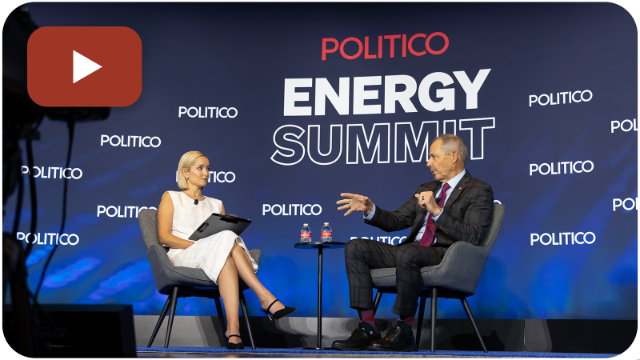

Over the years, Senator Curtis has spoken with energy innovators across Utah—from the Uintah Basin to Beaver’s geothermal fields. These are cutting-edge facilities building the future of power, and they need certainty and predictability. We can’t cut the legs off of these enterprises. Doing so would damage Utah’s economy, put America’s energy future in jeopardy, and weaken our national security. We must take a reasonable, responsible approach to energy tax credits.
The Deseret News Editorial Board penned an opinion piece expressing support for Senator Curtis’ position on energy tax credits in the reconciliation bill currently being considered in the Senate.
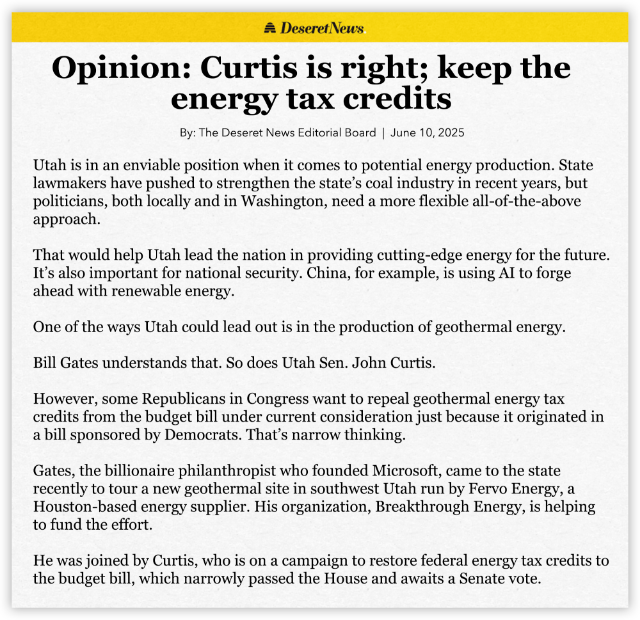
Full story by The Deseret News Editorial Board here.

America's energy future can be affordable, reliable, and clean—and geothermal will be a major part of that progress. Senator Curtis toured Fervo Energy’s Cape Station geothermal project, a next-generation clean energy initiative located in Beaver County, Utah. He was joined by company leaders, project engineers, and Bill Gates, founder of Breakthrough Energy, for a firsthand look at one of the most ambitious geothermal developments in the nation.
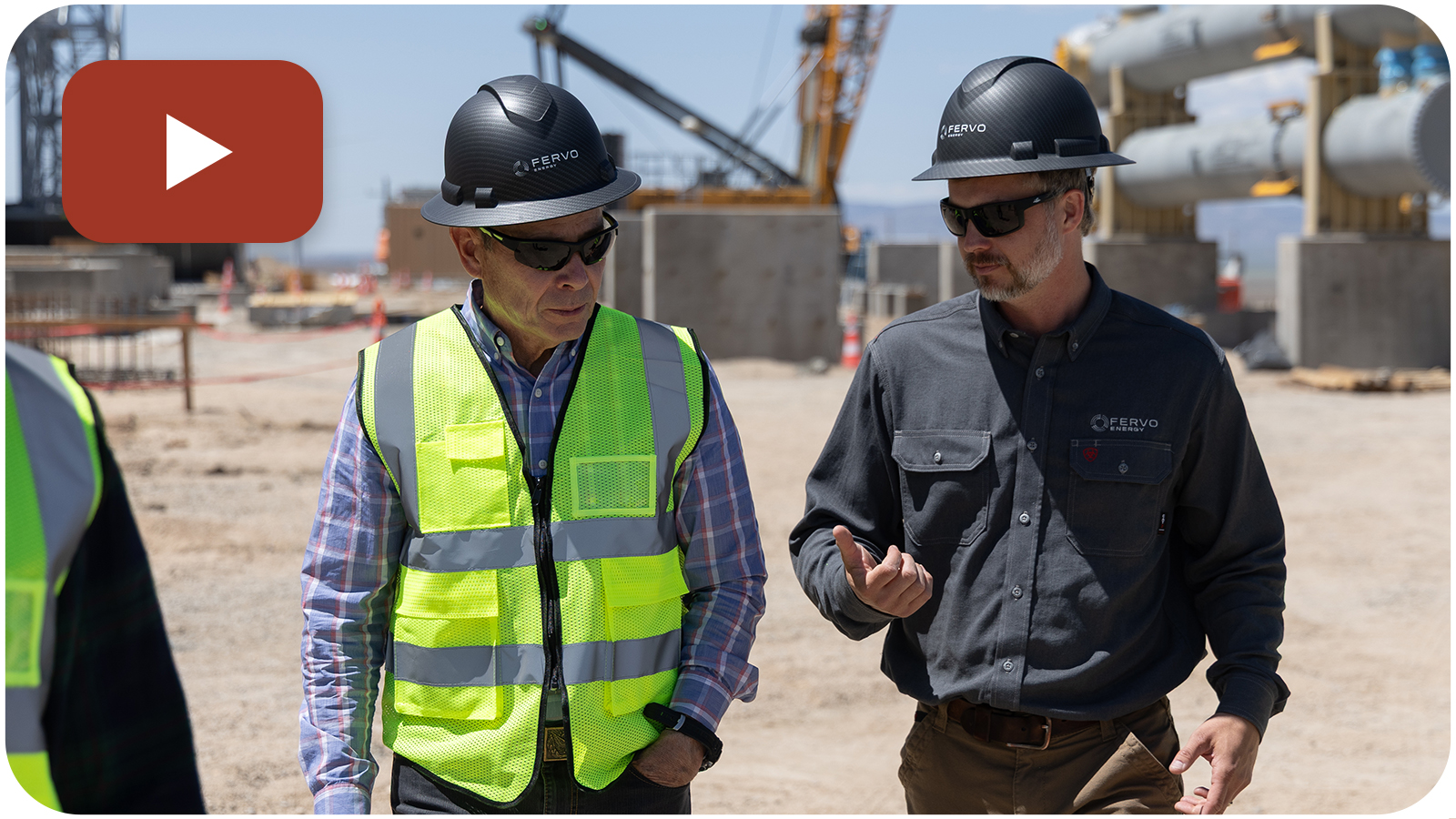
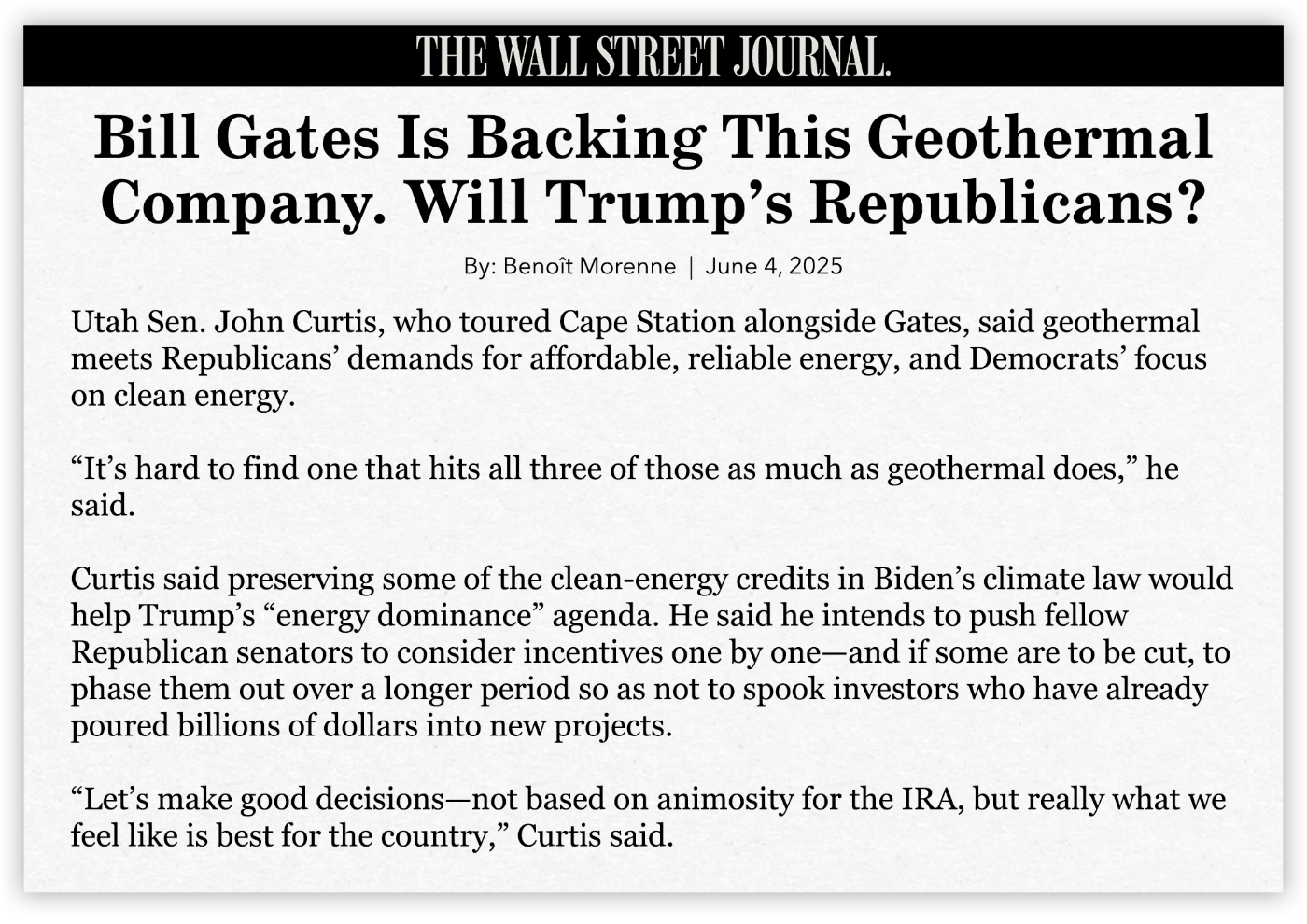
Full story by Benoît Morenne here.

Senator Curtis penned an opinion piece in the Deseret News regarding energy tax credits from the Inflation Reduction Act. The Senator makes the case for a “scalpel, not a sledgehammer” approach to these incentives during the budget reconciliation debate. He urges fellow Republicans to apply conservative principles—fiscal restraint, targeted support, and deregulation—without reflexively dismantling policies that are already driving private-sector investment in American energy independence. The message is clear: if we kill innovation with political overreach, we risk ceding energy leadership to China and Russia.
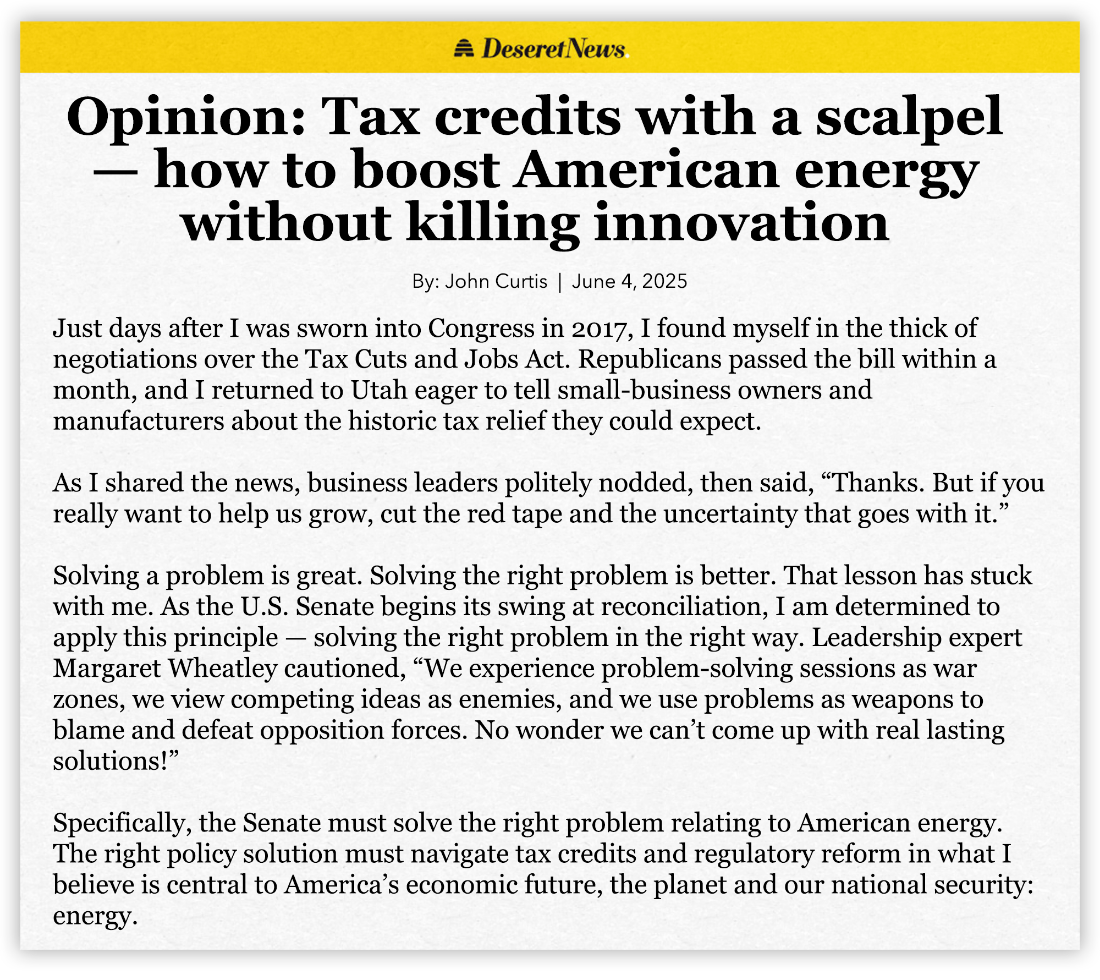
Full op-ed by Senator Curtis here.

As energy demand continues to grow, we need an all-of-the-above approach that supports Utahns and provides the long-term certainty businesses need to invest and expand. In Utah, we’ve seen firsthand how smart policies can drive innovation, strengthen our economy, and create real opportunity. Senator Curtis visited energy storage company Fluence’s manufacturing facility in Tooele County to see the value of these incentives in meeting both our energy production and economic development goals.
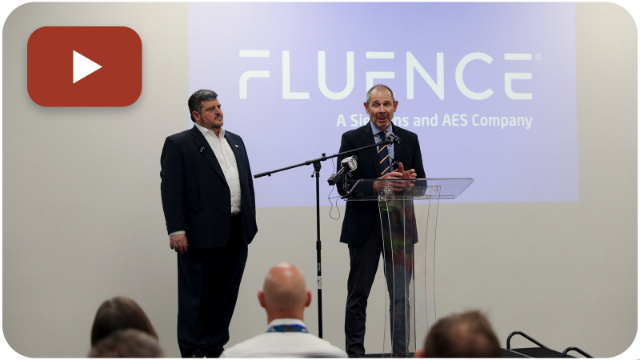
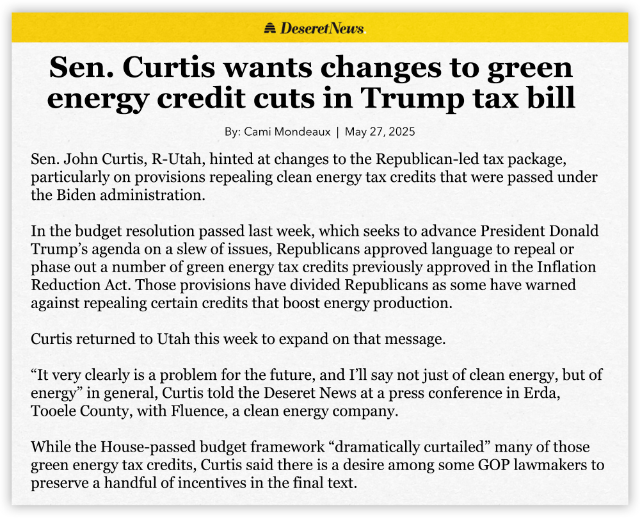
Full story by Cami Mondeaux here.

Senator Curtis joined Breaking Battlegrounds podcast to reflect on the importance of listening in his maiden Senate floor speech, highlight Utah’s leadership in energy innovation, and discuss his bipartisan forest management bill.


During a Senate Commerce Committee hearing on removing regulatory barriers in the AI supply chain, Senator Curtis underscored Utah’s readiness to lead the next generation of artificial intelligence infrastructure while advocating for balanced energy policy and AI accessibility for small businesses. In an exchange with OpenAI CEO Sam Altman and Microsoft Vice Chair and President Brad Smith, Curtis raised concerns about protecting ratepayers amid rising energy demands, and emphasized the practical ways AI models—like ChatGPT—are supporting small business owners.
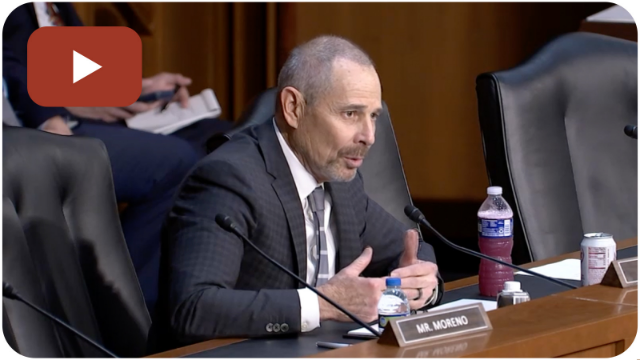

A rule put forward under the Biden Administration shut the door on progress. It told companies that no matter how much they invested to reduce harmful emissions, they would still be punished with permanent red tape. That’s not good science, it’s not good governance, and it certainly isn’t good for the environment.
The Senate passed legislation introduced by Senator Curtis to overturn the rule, restoring a pathway for emissions reductions to be recognized in regulatory classification—allowing chemical manufacturers, refineries, and energy producers to make environmental improvements without being penalized by permanent red tape.
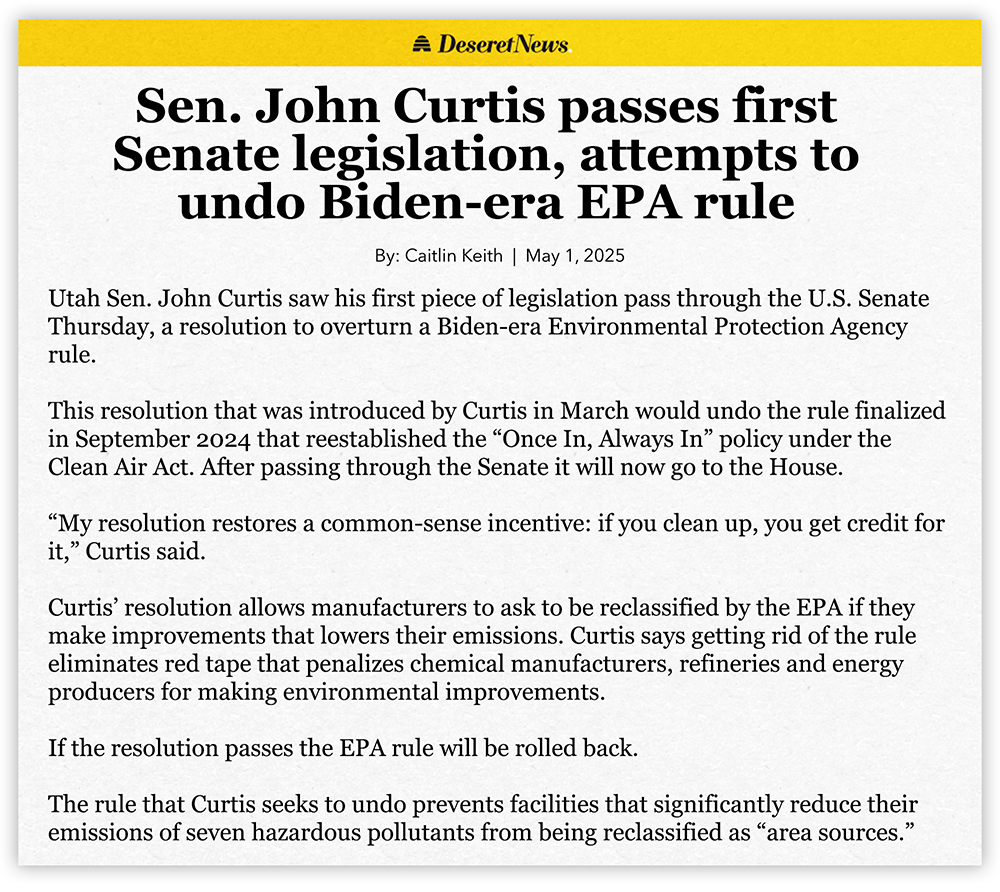
Full story Caitlin Keith here.

It shouldn’t be hard to approve wind and solar projects on federal lands that have already been permitted for energy development and gone through all necessary environmental reviews. During an event on energy policy hosted by the Emerson Collective and Heatmap News, Senator Curtis outlined his Co-Location Energy Act, bipartisan legislation he introduced with Senator Hickenlooper (D-CO) that takes a commonsense approach to unlocking renewable energy potential without compromising existing operations.
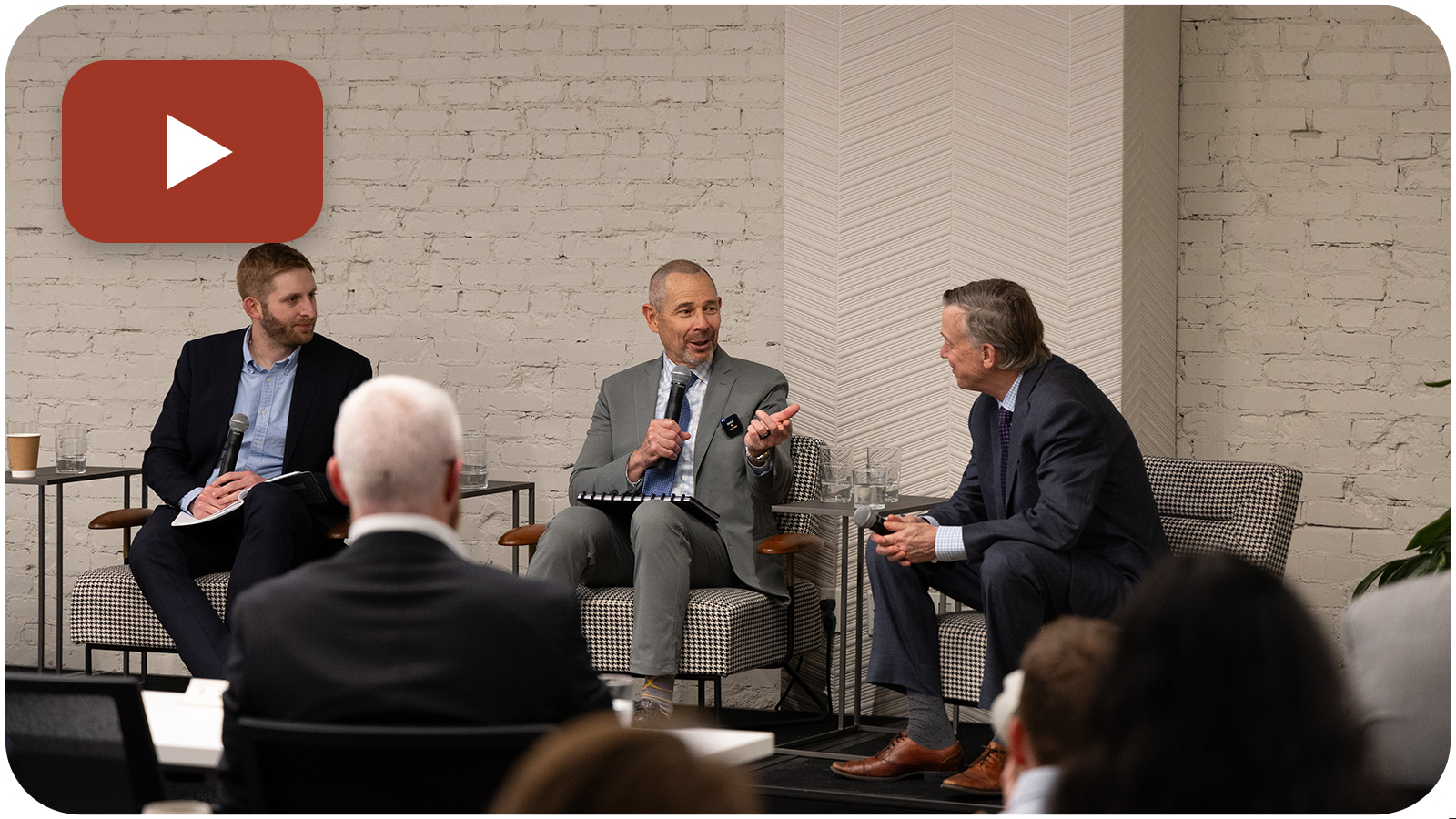

During an Environment and Public Works Committee hearing, Senator Curtis underscored the urgent need for permitting reform to unlock energy development in Utah and across the nation. While speaking with expert witnesses, Curtis highlighted how Utah is leading the way in clean energy with initiatives that expand geothermal, nuclear, and hydrogen development.
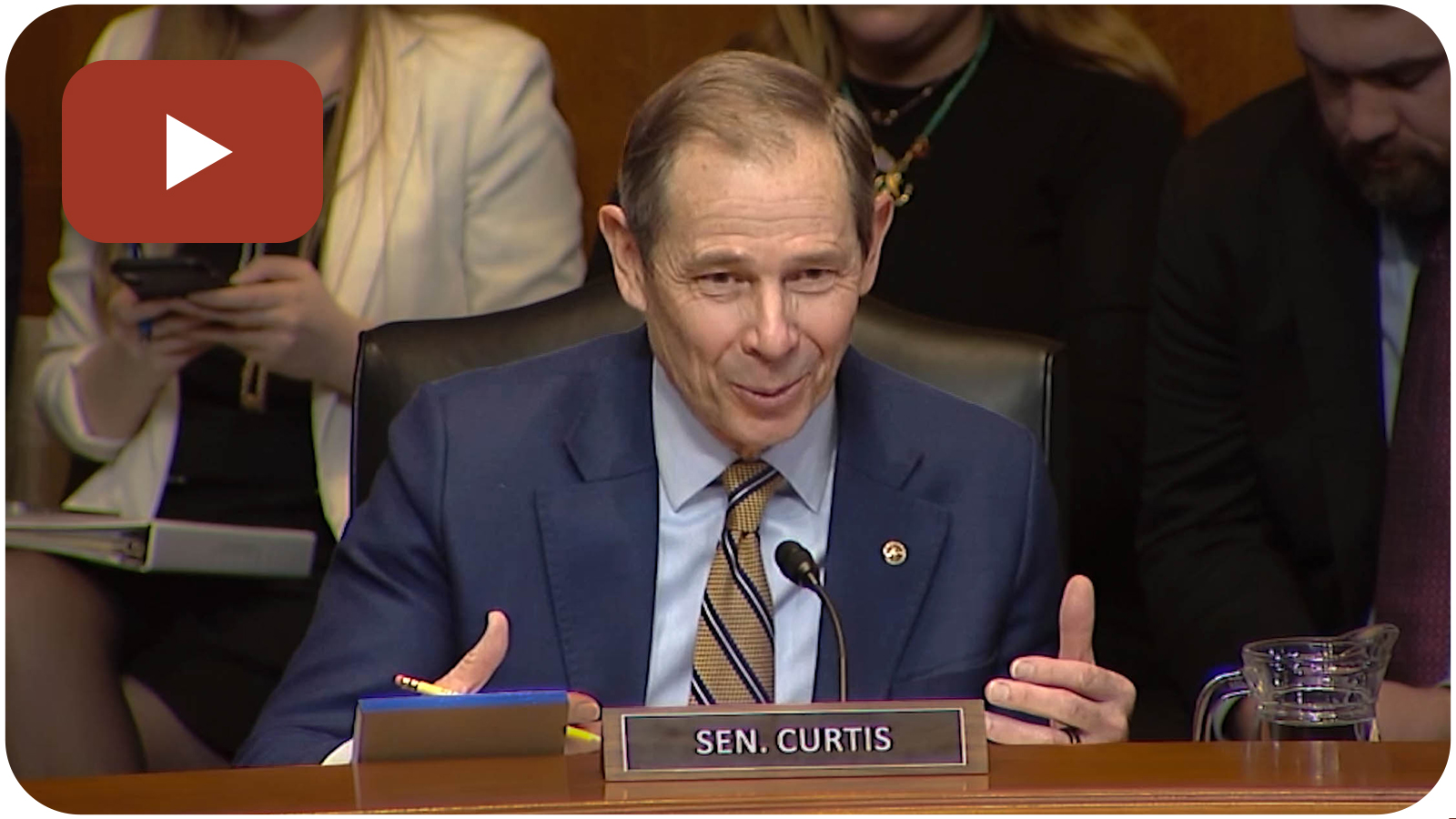
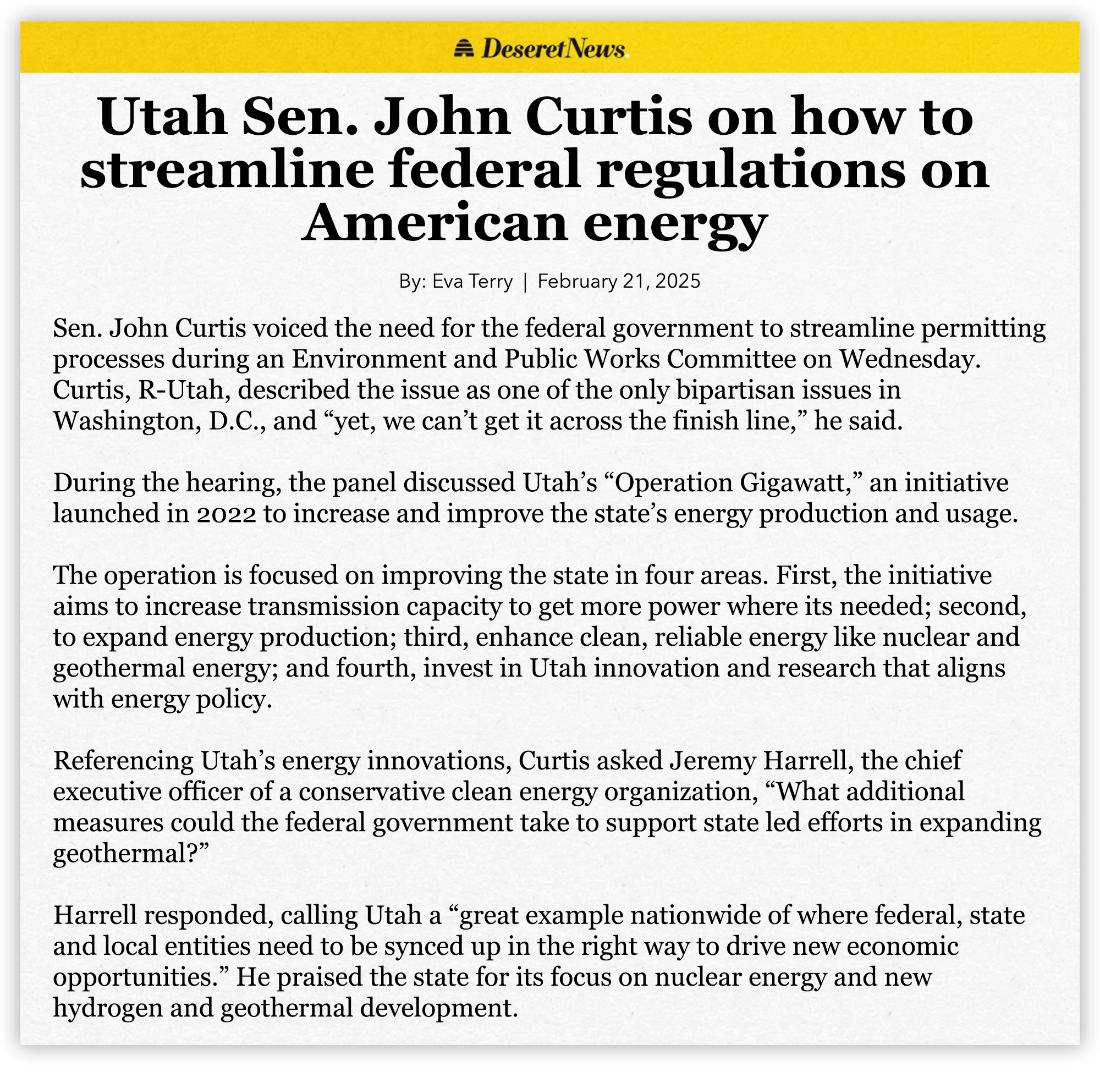
Full story by Eva Terry here.

|

Senator Curtis toured one of Utah’s active coal mines and met the men and women working to keep homes powered and the economy strong. We need every single electron at our disposal, and resilient forms of energy to do it. The Utahns he met outside of Salina are helping make that a reality.
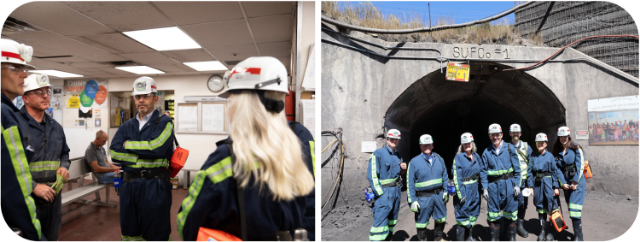
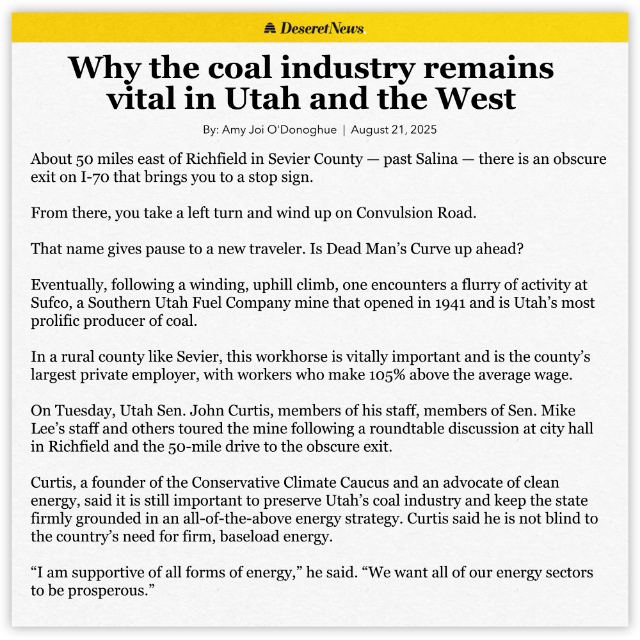
Full story by Amy Joi O'Donoghue here.

Senator Curtis first met the founders of Torus in 2021 when they were working out of a garage with a vision to solve energy challenges. Today, they’re leading the way in energy innovation. Their growth is one of many Utah success stories and it’s great to have seen their progress.
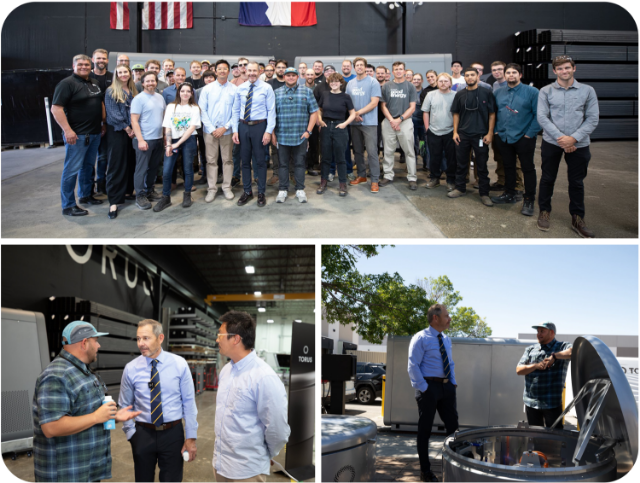

Senator Curtis met with the Salt Lake Chamber to talk permitting reform. Utah’s growth demands a system that’s affordable, reliable, and built for the future. He appreciated hearing from business leaders about the importance of getting government out of the way of good ideas and projects.
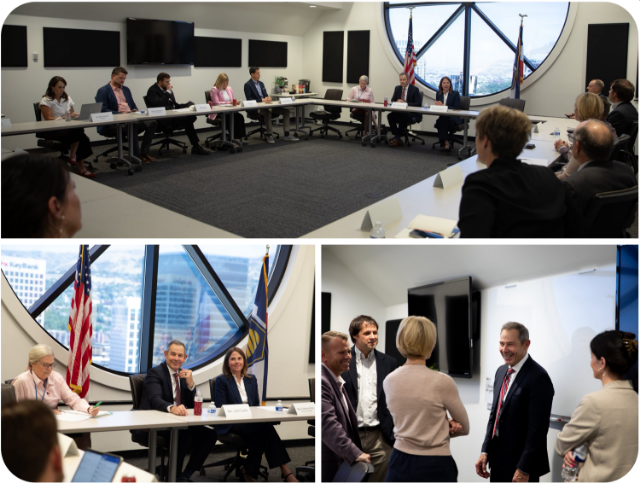

Senator Curtis met with the Business Council for Sustainable Energy to discuss how Utah’s leadership in innovation and energy independence can help build an affordable, reliable, and clean energy future.


As we work to unlock America’s abundant natural resources, Utah will play a central role in driving that growth. Senator Curtis met with Utah’s mining leaders and local officials to discuss how we can strengthen rural economies, responsibly develop domestic resources, and ensure our mining future is sustainable, secure, and aligned with the values that make Utah strong.


|
|

Behind every successful case is a dedicated team member who takes the time to listen and follow through. One constituent recently shared how their caseworker provided efficient, compassionate, and timely support throughout the process. With their permission, we’re sharing their story to show how our team works to serve each Utahn with care and respect.
.png)
If you can't get an answer from a federal agency in a timely fashion, or if you feel you have been treated unfairly, our office may be able to help resolve a problem or get you the information you need. While we cannot guarantee you a favorable outcome, we will do our best to help you receive a fair and timely response to your problem.


|

Registration is now open for the 4th Annual Conservative Climate Summit, which will take place on Friday, October 17, 2025, at the University of Utah. Visit curtis.senate.gov/ccsummit to secure your FREE ticket today!
Spots are expected to go quickly, so we encourage you to register as soon as possible. This year’s summit will feature leading voices in conservative climate solutions, interactive sessions, and networking opportunities with members of Congress, industry executives, and government leaders from across the country.
Our full speaker line-up and event program will be announced soon, so please stay tuned for more information
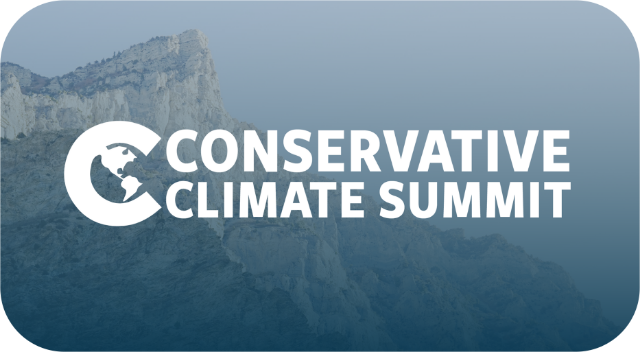

|

Senators urge USDA to bolster wildland firefighting (Politico)
Sen. John Curtis predicts big role for wind, solar power in Utah's future energy landscape (Cache Valley Daily)

|
|
Correction to “Highs and Lows: Supporting Local Communities:” Last week, we made a mistake when referring to counties with a high percentage of federal land:
“In some counties, more than 90% of the land is owned and controlled, not by local leaders or communities, but by a distant, federal government. I saw this again this week in Morgan County. Ninety percent of their land is federally owned.”
Instead of sharing information about Morgan County, we should have said Wayne County, where 96.3% of the land is public land, about 85% of which is federal. In Morgan County, only 6.8% of land is public with about half of that being federal. Source: Utah’s Land Ownership Legacy: A History and Inventory of Utah’s Lands

Unsubscribe |
|
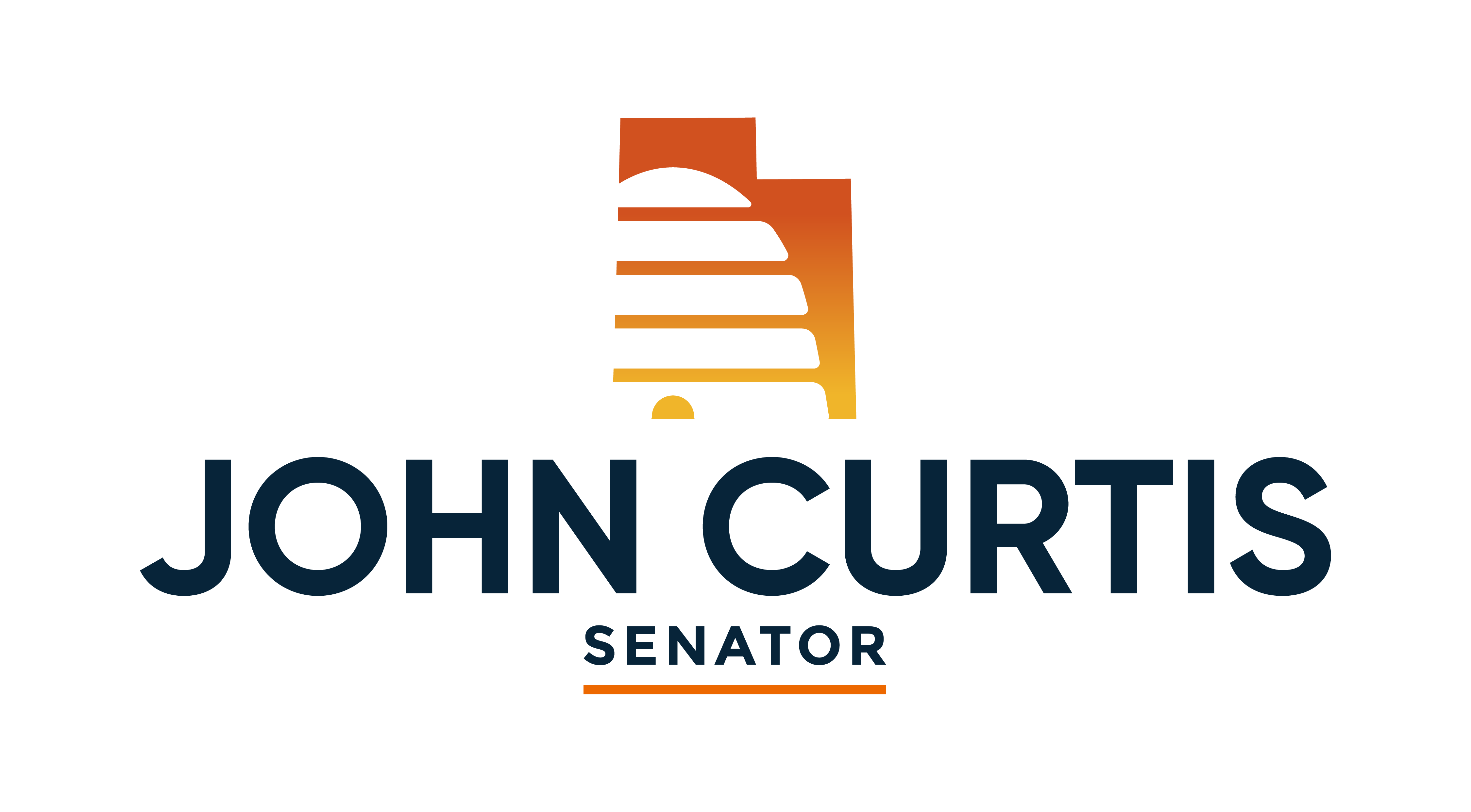 curtis.senate.gov curtis.senate.gov |
|
 
|
|